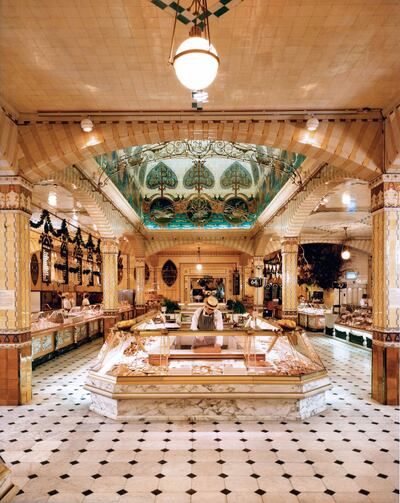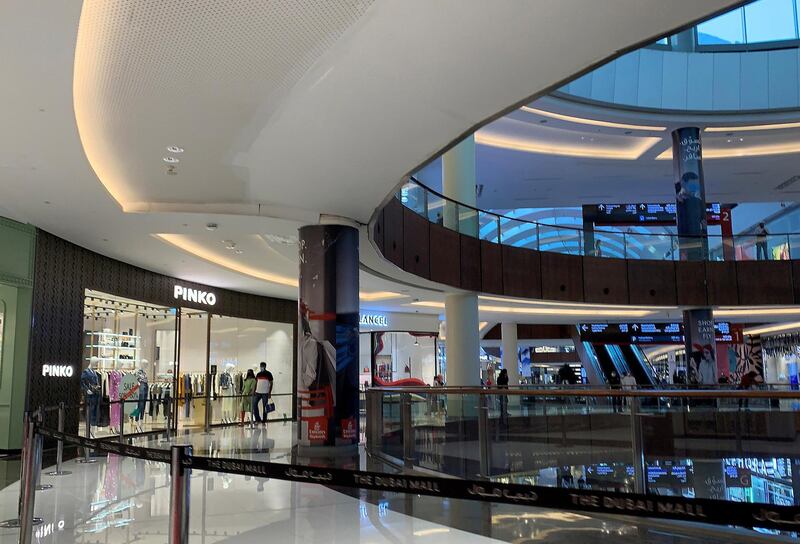A report by consultancy McKinsey and industry publication Business of Fashion has revealed a 90 per cent decline in profits for the fashion retail industry in 2020.
That's a staggering downfall even in the midst of a pandemic. And yet the coronavirus crisis has sent shockwaves around the world, having an impact on every sector of the global economy, fast-forwarding trends that were already changing the way we consume everything from fashion and food to leisure and entertainment, all of it speeded up by the digital revolution.
Given the cancellation of physical runway shows and, indeed, fewer occasions requiring new clothes, the industry suffered its worst on-record fate, with almost three-quarters of listed companies losing money. Behind it all lies the impact, or lack thereof, of tourism.

No tourists, no sales
Retailers in major shopping hubs experienced significant losses, as high-spending tourists from China, Russia and the Middle East stayed away from European fashion capitals.
According to McKinsey's The State of Fashion 2021 report, French luxury department store Galeries Lafayette said it was facing a €1 billion (about $1.17 billion) loss in 2020, while its Italian counterpart, La Rinascente, expected a 20 per cent to 25 per cent drop in annual revenues.
“There are some great [shopping] districts around the world, but it’s a real problem for districts to reinvent themselves [now],” said Anne Pitcher, managing director of Selfridges Group.
In London, stores face the double-edged sword of the pandemic and Brexit, with the government’s proposed scrapping of VAT-free shopping on Friday, January 1.
Retailers in the UK were desperately trying to recoup losses during the pre-Christmas rush, until new Tier 4 restrictions forced shops to close again on December 19.
Michael Ward, managing director of Harrods, said customers might have been few in number on December 2, the first day after the UK's second lockdown, but sales were up 24 per cent compared with the same day last year, as shoppers were spending on luxuries such as a Chanel bag or Patek Philippe watch rather than sightseeing the Food Halls.

Dubai, as a major tourist and shopping hub, has been affected by the dearth of footfall. Travel and tourism account for about 16 per cent of GDP in the UAE and have suffered the most, with travel data journal Tourism Economics expecting visitor numbers to drop by nearly 60 per cent in 2020 overall. As a consequence, says Patrick Chalhoub, chief executive of the Chalhoub Group, "the luxury industry was heavily impacted, especially in malls like The Dubai Mall, where we usually enjoy heavy traffic from tourists".
Last month, Mohamed Alabbar, founder of Emaar Properties, revealed that The Dubai Mall was welcoming about 100,000 visitors daily compared with pre-Covid numbers of 250,000. In August, Emaar Malls reported net profits down 69 per cent for the first six months of this year, from $308 million to $94m.
Unlike in Europe, Dubai's malls started opening up in June with stringent safety measures in place, but it was the lack of stopover tourists from Asia, notably China, that has made recovery slow. The Chinese still have to self-isolate for two weeks when they return to China and consequently many have resorted to staycations.
However, travel corridors with some European and Middle Eastern countries have opened up, and Emirates airline is expecting more than 200,000 passengers over the holiday period to pass through Dubai airport, which is good news for retail.
Chalhoub anticipates the recovery in tourism will be slow, but hopes Expo will boost a bounce back next year. In the meantime, retailers are pivoting to local customers. He highlights incentives encouraging visitors from around the Gulf, but admits "the local drive alone could not offset the losses we suffered with the reduction in tourism".
All eyes online

The silver lining for brands and retailers is that the lust for luxury spending did not wane, it just shifted online, speeding up a process that was already gaining momentum.
E-commerce grew 22 per cent in 2019, representing 12 per cent of the market. When figures are released for 2020, those numbers are expected to have swollen further.
“We certainly have seen year-over-year demand from customers within the Middle Eastern region,” says Edward Sabbagh, managing director of Farfetch Middle East.
There has been a clear shift in purchasing behaviour towards online channels that’s been driving luxury industry growth for quite a while, “but there has been an obvious acceleration for existing trends”, he adds.
Farfetch doubled down its support of existing boutique partners helping with logistics, marketing and operations. At the same time the brand "added 18 new stock points this year for a total of 92 stock points in the Middle East", says Sabbagh. Among them are Valentino, Stella McCartney and Kenzo, and Farfetch will continue to expand business with its existing brand partnerships in Saudi Arabia and Kuwait.
Kering, the luxury group behind Gucci, Saint Laurent and Bottega Veneta, has seen its online revenues more than double this year and is finding ways of making Gucci's network of 500 stores relevant in an overwhelmingly digital world, as well as fast-tracking an e-commerce overhaul of its other billion-dollar brands.
Gucci was among those that departed the established fashion calendar to unveil its seasonal collections at its own pace. In November, it presented the online GucciFest with a seven-part mini-series directed by Gus Van Sant, featuring Billie Eilish, Harry Styles and other celebrities wearing the spring / summer 2021 collection. Designer Alessandro Michele was seeking a fresh and effective way of engaging with Gucci's online followers with a bid to start a cultural conversation.
Balenciaga similarly experimented with the digital format by creating a video game to showcase its autumn / winter 2021 collection. In mid-December, Saint Laurent and Alexander McQueen released mesmerising films online, accessible to all, of their spring / summer 2021 collections; the former a slick "runway" presentation shot in a desert landscape, and the latter a fashion film-scape set on the Thames riverbank.
The way we shop
Rewiring the way we shop has also highlighted some changes in the ways we are living. Sabbagh points out an increased interest in leisurewear and activewear, while the cancellation of events has had an impact on the sale of dresses and evening gowns.
“However, as countries started opening up and restrictions began lifting, we did notice a return towards pre-Covid purchasing behaviours,” he says.

Another winner were expensive discretionary items such as watches, jewellery and exclusive handbags selling well across all major e-commerce platforms, as well as brand sites.
However, the acceleration of online doesn’t mean stores will die, says Chalhoub. “They will transform; physical retail will remain; stores will reinvent themselves.”
Improving the customer experience was a priority even before the coronavirus accelerated its importance.
“The journey must be hybrid,” Chalhoub adds. “It needs to incorporate digital because this is where our consumers are the most today: design spaces that reflect a sense of home and enhance a sense of security, well-being and promote calm.”
One senses, after these strange and challenging times, this is exactly where one will want to shop in future.





